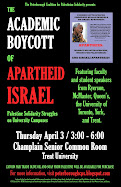by Sarah Kardash and Stacy Douglas
February 3rd to 10th 2008 marks the fourth annual Israeli Apartheid Week. This international week, which began in Toronto in 2005, has now spread to Palestine, South Africa, Norway, the UK and many cities across the US and Canada. In Toronto events will take place at the University of Toronto, Ryerson University and York University.
An increased interest in these events on campuses world-wide has come at least partially as a result of the British-lead academic boycott against Israeli Universities. While touted as a controversial move, advocates of the boycott, divestment and sanctions (BDS) strategy assert that Israel holds a dominant role as a superpower in the conflict, and is buoyed by the world's fourth strongest military and a highly developed economy. According to supporters, the boycott comprises a non-violent and peaceful strategy aimed at bringing justice and therefore peace to the region. The application of a BDS strategy is inspired by the success of the struggle in the 1980s to abolish apartheid in South Africa. In the face of a formidable apartheid regime in South Africa, university students, labor unions, and churches used their economic agency to apply leverage to the demand that all racist and discriminatory practices be renounced.
In 1947-1948, over 60% of the indigenous Palestinian population were dispossessed from their land and driven from their homes. In their wake, Israel, a state resembling apartheid South Africa, was established on their homeland. Palestinians call this process of ethnic cleansing, which also includes 40 years of brutal military occupation of the West Bank and Gaza Strip, Al Nakba, or ‘The Catastrophe’. In 2004 the International Court of Justice declared Israel’s currently erected ‘security barrier’ to be a violation of international law and to have it dismantled. Four years later, the 640 km long wall, complete with heavily policed checkpoints, still stands.
The call for BDS was initiated in July 2005 by over 170 Palestinian civil society organizations, including the Palestine trade union movement. These punitive measures are intended to be maintained until Israel ends its occupation and colonization of all Arab lands and dismantles the aptly named apartheid Wall; recognizes the fundamental rights of the Arab-Palestinian citizens of Israel to full equality; and respects, protects and promotes the rights of Palestinian refugees to return to their homes and properties as stipulated in UN resolution 194.
In the summer of 2007, while most students and faculty were off campus, presidents from over 20 universities in Canada – including Trent’s Bonnie Patterson – unilaterally issued statements declaring their opposition to the boycott of Israeli academic institutions. In response to this bold move, the Ryerson Students' Union passed a motion calling for the statement to be retracted and for a transparent and honest debate to be held around the university response to Israeli apartheid – the President's Office and the Student Union co-hosted a debate on this issue in November. In early October the Association pour une Solidarité Syndicale Étudiante (ASSÉ), which represents 60,000 CEGEP students in Quebec, approved an important motion joining the global movement for boycott, divestment and sanctions. Delegates to the 2006 CUPE Ontario annual convention passed a similar resolution (Resolution 50), which supports the international BDS campaign against Israel until that state recognizes the Palestinian right to self-determination. As such, CUPE has identified the Israeli-Palestinian conflict as a priority, according to their website, “particularly as Israel has violated more U.N. resolutions than any other country”.
In Peterborough, a coalition of individuals have recently come together out of a common interest in building a collective voice in support of the growing Palestinian solidarity movement. According to members of the group, called the Peterborough Coalition for Palestinian Solidarity (PCPS), their aim is to encourage awareness and informed debate and to organize collectively against Israeli apartheid. PCPS also seeks to make links with ongoing International struggles to end the Israeli occupation of Palestine, such as the Wall Must Fall and the Boycott, Divestment, Sanctions campaigns.
PCPS’s first event is sponsored by CUPE Local 3908, which represents contract faculty and student academic workers at Trent University. The event is part of CUPE’s efforts to educate its members on the apartheid nature of the Israeli state and Canadian political and economic support for these practices. Labour-focused, the PCPS event will also cover the role of trade unions in a growing global movement in solidarity with Palestine. Katherine Nastovski, member of the Coalition Against Israeli Apartheid and former Chair of CUPE Ontario's International Solidarity Committee will present on CUPE's Resolution 50 and Herman Rosenfeld, CAW retired staff person, will discuss the reasons why Canadian workers and unions should support the rights of Palestinians.
The free event is scheduled for February 3rd from 11:00 to 1:00, in the Traill College Lecture Hall. All are welcome to attend.

